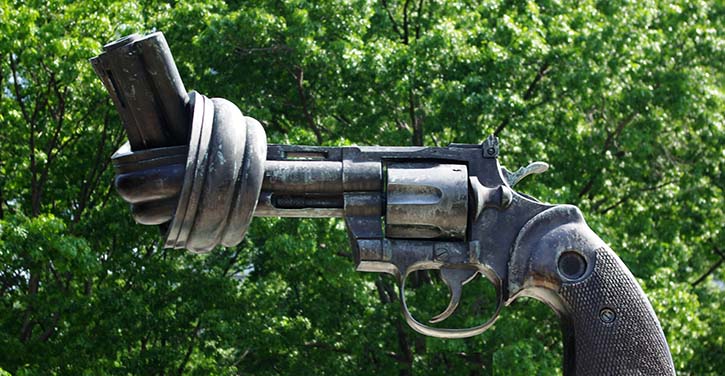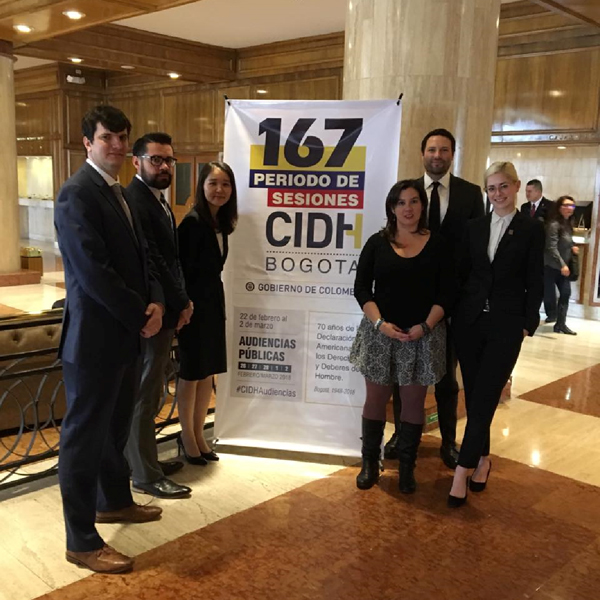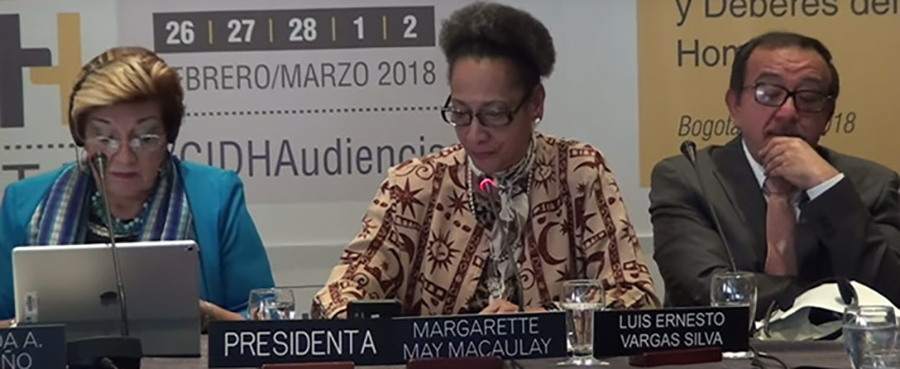By: Jiyeon Kim and Nicole Smith
As part of the Harris Institute’s new Gun Violence and Human Rights Project, the Institute was invited to submit testimony to the Inter-American Commission on Human Rights during their hearing on “Regulation of Gun Sales and Social Violence in the United States.” Two Washington University School of Law students, Nicole Smith and Jiyeon Kim, presented the Institute’s testimony in Bogotá, Colombia on behalf of Professor Leila Sadat in February.

Created in 1959, the Inter-American Commission on Human Rights (IACHR) aims to promote and monitor human rights in the Americas. There are multiple avenues for dialogue with the IACHR, including through thematic hearings initiated by the Commission. The Commission has previously encouraged the U.S. to redress gun violence through effective gun control policies and this winter, the Commission called for a thematic hearing on this important topic.
The Commission invited the U.S. Government and four members of civil society to present testimony during the hearing. In addition to the Harris Institute, the other members of civil society were the Center for American Progress, Igarapé Institute, and Amnesty International. Representatives from all four civil society groups coordinated our testimony to deliver the most comprehensive and effective message possible. We also developed a list of joint recommendations that we could all endorse. In this way, we presented as a united front.
The hearing was held on February 27, 2018. Reflecting the high interest in this issue, not least of all because it was only two weeks following the tragic Parkland School shooting in Florida, the room was full. Representatives from civil society were positioned directly facing two representatives from the U.S. State Department, with IACHR members including the President Margarette May Macaulay, First Vice-President Esmeralda Arosemena de Troitiño, and Second-Vice President Luis Ernesto Vargas Silva, seated in the middle.

Eugenio Weigend Vargas, Associate Director of the Center for American Progress’ Gun Violence Prevention Unit, opened the testimony by emphasizing that the United States is in a state of crisis because of our gun violence epidemic. He laid a strong factual groundwork, including the fact that every day, approximately 92 people die from guns and another 219 are injured. Not only that, but based on the Center’s research, the United States has a gun homicide rate that is 25 times higher than other developed countries and young Americans are 82 times more likely to be murdered with a firearm than those in peer nations.
The Harris Institute then testified that while guns are regulated by both federal and state law in the United States, these laws (or lack thereof) are failing to protect our citizens. We noted the background check loophole for private gun sales, the expiration of the federal Assault Weapons Ban in 2004, and that the Senate is considering a bill that would require states to honor the concealed carry permit issued by another state. Our testimony stressed that the United States has failed to act, despite the fact that the experience of other countries clearly demonstrates that gun control laws work to reduce fatalities. We pointed to Australia, which has not had any mass shootings since passing the National Firearms Agreement (NFA) in 1996, and to the United Kingdom, which adopted two firearm laws in 1997, and in 2012 only suffered 32 gun homicides, compared to the 11,622 in the United States.
Katherine Aguirre Tobón from Igarapé Institute then detailed how the high prevalence of gun violence in Latin American countries directly correlated to illicit firearms availability, much of which can be traced back to the United States. A considerable share of illegal weaponry and ammunition in Latin America was originally purchased legally from federally-licensed dealers and gun shows in the United States and subsequently brought into other American countries. Indeed, it is estimated that approximately 213,000 guns are smuggled across the United States-Mexico border annually. Tobón emphasized that United States’ inadequate restriction of “straw man purchases and illegal trafficking” leads to the high prevalence of gun violence in Latin American States.
Lastly, Zeke Johnson, Director of Amnesty International USA’s Security & Human Rights Campaign, presented our joint recommendations. We called for the Commission to conduct an additional hearing with survivors, families of victims, and representatives of impacted communities in the United States. We also urged the Commission to draft a report on the issue of gun violence in the United States, including best practices on how the government can meet its obligations under international law.
The U.S. State Department representatives then responded. They challenged the Commission’s right to hold an ex officio hearing on what they framed as a purely domestic matter. Regarding the specific issue of gun violence, they emphasized the Second Amendment and the Supreme Court’s majority decision in District of Columbia v. Heller, without offering any substantial or direct rebuttals to civil society’s arguments or recommendations. However, in light of the importance of the issue and the attention it currently commands, they suggested a follow-up hearing in Washington D.C.

The Commission members’ comments largely focused on the tragedy of mass shootings, and school shootings in particularly. They noted with emphasis the validity of their jurisdiction over matters such as this and welcomed the State Department’s suggestion to hold a follow-up hearing on the gun violence issue in Washington D.C.
All of us were pleased and proud of to have contributed a voice to such a crucial matter and had the feeling that this was just the first step in an important direction in the fight to reduce gun violence in the United States. It was a joy and an honor to have played a part in such a wonderful and powerful moment. We cannot thank the Whitney R. Harris World Law Institute enough for this experience.
